Take a company you have a problem with
1. Imagine you hate Ryanair. I do not btw they are just an example of a company this would work on.
2. You decide you want to harm them commercially
3. You go to their terms and conditions here and see they do not allow linking to their website
"Links to this website. You may not establish and/or operate links to this website without the prior written consent of Ryanair. Such consent may be withdrawn at any time at Ryanair’s own discretion."
There is a list of other companies that do not allow linking listed here. That where I heard of this T&C clause.
4. Now spider all the websites that do link to them. This is easy to do and you now should have a list of many websites. Either from a whois or just from scraping the website get an email address for each site.
5. Send all these linking websites official looking notices that remind them that "You may not establish and/or operate links to this website without the prior written consent of Ryanair" including a link to the official Ryanair terms and conditions. You would have to be careful here. You would not claim to be Ryanair for legal reasons. You do not want to break any laws or threaten anything. Just say you are from some official sounding company "John Smith and associates business compliance coordinators" and remind them of what the companies own policies say. It is not like you are lying.
6. Watch Ryanair drop down search rankings as people delete links to them. Search rankings are mainly based on how many (and what sort of) sites link to you. As they drop down the search engine rankings they will suffer commercially. With my google of "cheap flight dublin london" Ryanair comes up as the third site. Which implies they must get a fair amount of traffic from search engines.
I think this attack should be called Search Engine Deoptimization.
Tuesday, March 29, 2011
Friday, March 11, 2011
Analog Computer Museum
This week I was lucky enough to visit the Analog Computer Museum near Frankfurt. Bernd who owns and protects the collection I have known for years via email so I was happy out to finally get to meet him and his wife. These Analog computers carry out calculations using electronic components.
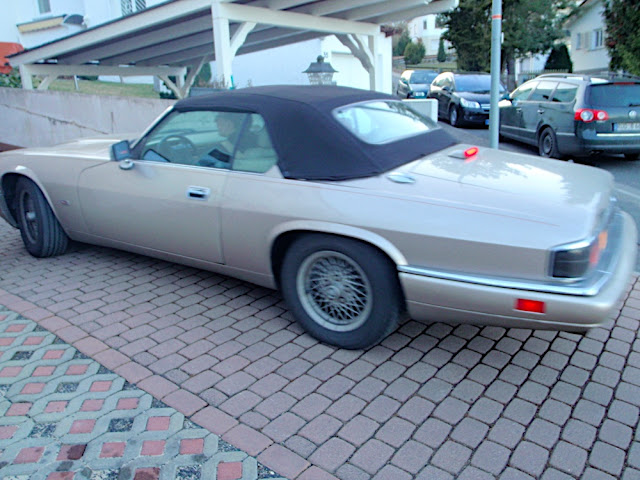
Bernd works as a software archeologist. That is he updates the systems of banks and such that are written in OS' and languages that almost no one knows anymore. If the software running your bank was written int he 60's and you want to get it running on Linux Bernd is the man to call. These languages are so obscure they make the COBOL look like the Beatles. The job seems to pay well enough as he can afford warehouses to keep his computer collection in and a collection of vintage sports cars he drives at terrifying speeds on the local autobahns.
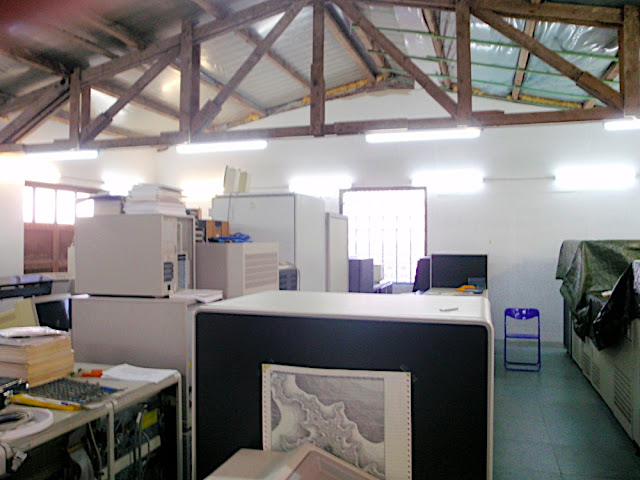

Yes I take my wife to Computer Museums but in fairness shes a physicist and I suspect she thought this rocked as much as I did
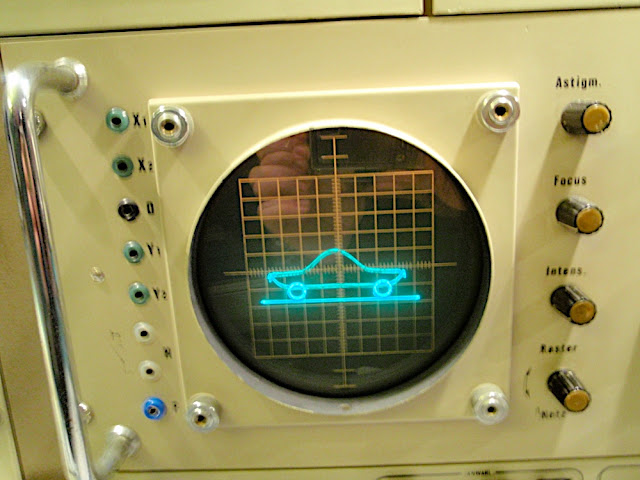

These machines are ideal for real time simulation. This Telefunken currently simulating a car was used to train nuclear powerstation operators with simulations of various 'problems'
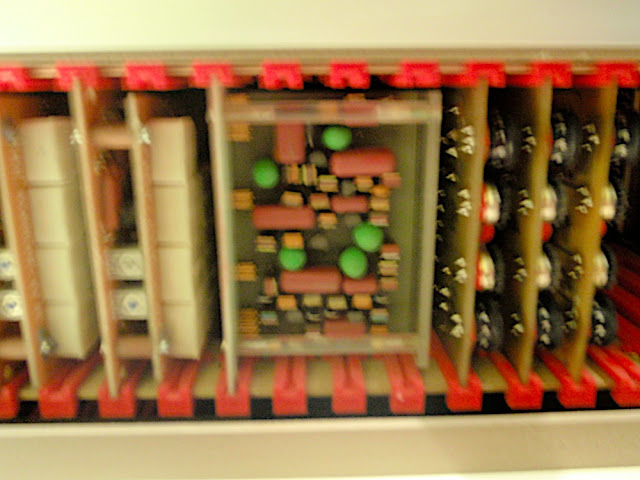
Next time you call rand() think of this board that was used to generate random numbers through electronics
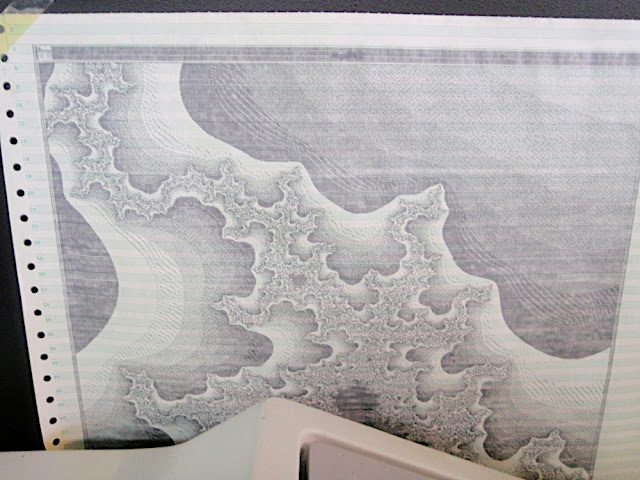
Old school fractal printed out and taped to the side of a Vax. It is like chalking up a kill on the side of a WW2 fighter plane. Computing from the time where men were men and debuggers were nervous.
I cannot rationalise why these analog computers are so cool (pics here). I think its to do with getting to the bare metal of a computation. Also something of the history of these machines is amazing. Looking at the circuit boards you can imagine national characteristics they describe. The German machines based on mathematical abstractions are beautifully clean (and easy to fix apparently). The Japanese machines were a mess like their remote controls. The British machines had a distinct boffin feel to them. The machines from communist countries really seems like a scramble of clever but under resourced hacks. The American machines were big brash and heavy.

Kevin Kelly claims that a technology never dies
But I really worry that the knowledge of many of the engineers who created these machines will be lost. One thing is that the analog museum really wants donations of machines that may be thrown out. If you see a box of the brand Dornier, TeleFunken, Gould, Aritma, BBC, Electronic Associates Inc, Solartron or even just something you think might be of interest send him an email. Even parts of these machines could be really useful to help repair the computers he has.
I do not think these machines are purely of historic interest. It is possible that in the future analog computers will be used in the real time simulations they excel in. One area I think they could be useful for is search engines. Linear algebra calculations are at the heart of modern search engines. this is described in
The $25,000,000,000∗ Eigenvector the linear algebra behind google and How Google Finds Your Needle in the Web's Haystack
These calculations do not need to be precise (the google algorithm uses random walks) which removes one of the big objections to analog computers.
George Dyson in the this years edge question 'What Scientific concept would improve everybody's cognitive toolkit?' describes a search engine based on analog computers here
Analog computer methods of calculating eigenvectors have been described decades ago (pdf here).
It is possible that the techniques of analog computers could be the future of search engines. We should make some effort to save these machines, any manuals written on them and if possible some of the knowledge of those who made and used them.

Bernd works as a software archeologist. That is he updates the systems of banks and such that are written in OS' and languages that almost no one knows anymore. If the software running your bank was written int he 60's and you want to get it running on Linux Bernd is the man to call. These languages are so obscure they make the COBOL look like the Beatles. The job seems to pay well enough as he can afford warehouses to keep his computer collection in and a collection of vintage sports cars he drives at terrifying speeds on the local autobahns.
Yes I take my wife to Computer Museums but in fairness shes a physicist and I suspect she thought this rocked as much as I did
These machines are ideal for real time simulation. This Telefunken currently simulating a car was used to train nuclear powerstation operators with simulations of various 'problems'
Next time you call rand() think of this board that was used to generate random numbers through electronics
Old school fractal printed out and taped to the side of a Vax. It is like chalking up a kill on the side of a WW2 fighter plane. Computing from the time where men were men and debuggers were nervous.
I cannot rationalise why these analog computers are so cool (pics here). I think its to do with getting to the bare metal of a computation. Also something of the history of these machines is amazing. Looking at the circuit boards you can imagine national characteristics they describe. The German machines based on mathematical abstractions are beautifully clean (and easy to fix apparently). The Japanese machines were a mess like their remote controls. The British machines had a distinct boffin feel to them. The machines from communist countries really seems like a scramble of clever but under resourced hacks. The American machines were big brash and heavy.
Kevin Kelly claims that a technology never dies
What happens is that most technologies become obsolete, diminish their role, but they don't disappear--more idea-based and can be resurrected more easily. Seems like a silly claim: the hand-axe, the arrowhead--they don't exist any more. And that's what I thought too... Looking on the Internet was able to find an example of whatever the challenger had given to me: brand new steam-powered valve for a steam-powered car; they're making flint axes exactly the same way, using exactly the same tools to the point they are almost indistinguishable from the original; archeological artifacts, making in huge numbers today.
But I really worry that the knowledge of many of the engineers who created these machines will be lost. One thing is that the analog museum really wants donations of machines that may be thrown out. If you see a box of the brand Dornier, TeleFunken, Gould, Aritma, BBC, Electronic Associates Inc, Solartron or even just something you think might be of interest send him an email. Even parts of these machines could be really useful to help repair the computers he has.
I do not think these machines are purely of historic interest. It is possible that in the future analog computers will be used in the real time simulations they excel in. One area I think they could be useful for is search engines. Linear algebra calculations are at the heart of modern search engines. this is described in
The $25,000,000,000∗ Eigenvector the linear algebra behind google and How Google Finds Your Needle in the Web's Haystack
These calculations do not need to be precise (the google algorithm uses random walks) which removes one of the big objections to analog computers.
George Dyson in the this years edge question 'What Scientific concept would improve everybody's cognitive toolkit?' describes a search engine based on analog computers here
Analog computing, once believed to be as extinct as the differential analyzer, has returned. Not for performing arithmetic — a task at which even a pocket calculator outperforms an analog computer — but for problems at which analog computing can do a better job not only of computing the answer, but of asking the questions and communicating the results. Who is friends with whom? For a small high school, you could construct a database to keep track of this, and update it every night to keep track of changes to the lists. If you want to answer this question, updated in real time, for 500 million people, your only hope is to build an analog computer. Sure, you may use digital components, but at a certain point the analog computing being performed by the system far exceeds the complexity of the digital code with which it is built. That's the genius that powers Facebook and its ilk. Your model of the social graph becomes the social graph, and updates itself.
Analog computer methods of calculating eigenvectors have been described decades ago (pdf here).
It is possible that the techniques of analog computers could be the future of search engines. We should make some effort to save these machines, any manuals written on them and if possible some of the knowledge of those who made and used them.
Think Different
I am fascinated by how people think differently from each other. I think there are big differences in the fundamental methods people use to think, but because we rarely talk about how we think these are not well known.
Feynman talks here about how he heard numbers in his head when he counted and his friend saw numbers visually.
He believed that such fundamental differences explained why we sometimes have such difficulties communicating with each other.
I 'see' numbers as a kind of line and I have heard other people describe other ways they 'see' numbers
Reading is another place people think differently. When I read I 'hear' the words as I read them. This is called subvocalisation and is normal but it slows down reading. "Subvocalization, or silent speech, is defined as the internal speech made when reading a word, thus allowing the reader to imagine the sound of the word as it is read". There are all sorts of online guides as to how to stop subvocalising. My wife does not subvocalise and never has. She describes seeing words as the actual word rather then hearing it and then understanding what it means.
Do left handed people who do that hook handed over the top writing have a fundamentally different view of writing? Do you know of any other basic cognitive tasks that people carry out in completely different ways?
Feynman talks here about how he heard numbers in his head when he counted and his friend saw numbers visually.
He believed that such fundamental differences explained why we sometimes have such difficulties communicating with each other.
I 'see' numbers as a kind of line and I have heard other people describe other ways they 'see' numbers
Reading is another place people think differently. When I read I 'hear' the words as I read them. This is called subvocalisation and is normal but it slows down reading. "Subvocalization, or silent speech, is defined as the internal speech made when reading a word, thus allowing the reader to imagine the sound of the word as it is read". There are all sorts of online guides as to how to stop subvocalising. My wife does not subvocalise and never has. She describes seeing words as the actual word rather then hearing it and then understanding what it means.
Do left handed people who do that hook handed over the top writing have a fundamentally different view of writing? Do you know of any other basic cognitive tasks that people carry out in completely different ways?
Subscribe to:
Comments (Atom)